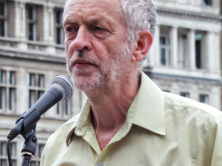
(Credit: Stuff/Facebook)
A column published by New Zealand’s Stuff news site suggested there was a link between conspiracy group QAnon and the advocacy group anti-1080. (1080 is a form of pest control).
Stuff‘s March 2019 column was published after the New Zealand mosque shootings and was headlined, “Facebook’s intolerable insult to New Zealand after Mosque shootings.” In question was the column’s references to the anti-1080 movement linking it to the gun lobby. A reader, Gary Howat, complained that the suggestion was inaccurate and “hate speech.”
The Stuff column included two paragraphs referencing 1080:
“Yet even as Prime Minister Jacinda Ardern was making her first comments on gun reform last Saturday morning, people travelling to the Womad music festival in New Plymouth were confronted by a bridge in the city festooned not only with anti-1080 signs, but also with placards carrying web addresses for the alt-right QAnon movement.”
“That the anti-1080 movement – with its deep connections to the gun lobby, its disregard for reason or truth, and radically anti-establishment leadership – is declaring a link to QAnon at all should be an early flag for security services seeking to prevent another Christchurch-style massacre.”
Stuff defended its column as opinion and argued the column “clearly explained the connecting thread” of seeing the signs.
The New Zealand Media Council agreed with the complainant, saying there was no evidence “unequivocally that there were posters linking QAnon and the anti-1080 movement” only that there were posters for both groups on the same bridge.
“The onus was on Stuff to provide evidence linking the two organisations and there were no facts provided,” the media council ruled.
The media council noted five of eleven members dissented with the ruling, finding the column was fine because it was an opinion based on an experience, a public debate, and criticism of a group, not of specific members.
Gary Howat, the man who complained about the article, told iMediaEthics by Facebook message that he thinks “so called opinion pieces push the boundaries of journalism.”
Howat continued, “They allow a journalist to apply their own bias and muddle the truth with what they write.” Howat said he thinks journalists haven’t been investigating 1080, and “I am pleased in this case the Council majority accepted my complaint, and I see it as a victory for reason and the little people.”
Stuff‘s editor Patrick Crewdson declined to comment, noting that “as a general rule we don’t comment on Media Council decisions.”






Comments Terms and Conditions